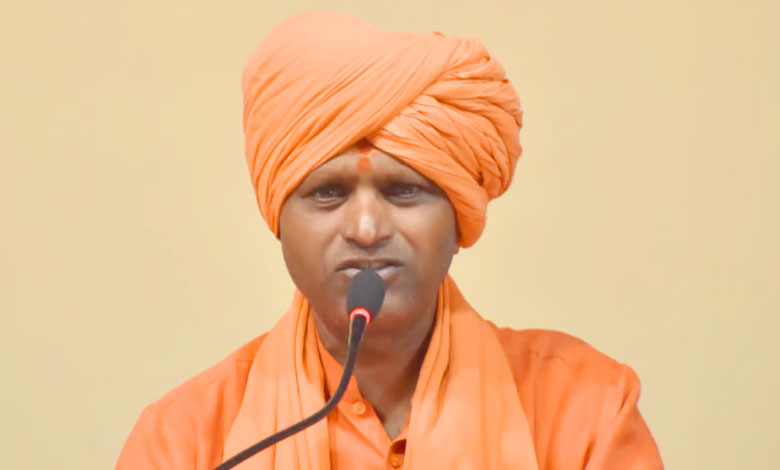Vande Mataram Should be Our National Anthem, not Jana gana mana Says Ramgiri Maharaj
Ramgiri Maharaj has sparked controversy by suggesting that "Vande Mataram" should be India's national anthem instead of "Jana Gana Mana." His remarks have ignited a debate on national symbols and their significance.

Aurangabad: A controversial statement was made by Ramgiri Maharaj, the Abbott of Goudha Dham, during a trailer launch event for the Marathi film Mission Ayodhya in Aurangabad.
Speaking at the event on Tuesday evening, Maharaj raised eyebrows when he suggested that India’s national anthem should not be “Jana Gana Mana,” composed by Rabindranath Tagore, but rather “Vande Mataram.” According to him, “Jana Gana Mana” was written by Tagore to praise George V, the British monarch, and thus should not be the anthem of an independent India.
Ramgiri Maharaj’s Controversial National Anthem Statement
Ramgiri Maharaj, known for making provocative statements, argued that George V had caused many injustices to India during his reign, and therefore, the national anthem should reflect the true spirit of India. He advocated for “Vande Mataram,” a patriotic song that calls for reverence and respect towards the nation. “We must be ready to struggle for this change,” he added, suggesting that the country should replace “Jana Gana Mana” with “Vande Mataram” as its national anthem.
This statement has sparked a significant controversy across the country. Many citizens have expressed their anger, accusing the religious leader of disrespecting the national anthem and insulting the country’s heritage. Critics argue that his remarks go against the dignity of the national symbols, while others claim that such statements could undermine national unity.
Background on “Jana Gana Mana” and “Vande Mataram”
“Jana Gana Mana” was written by Rabindranath Tagore in 1911 and was later adopted as the national anthem of India in 1950. The song was composed during the British colonial period and was initially sung at a conference to honor King George V during his visit to India, which has led to criticism from some quarters over its colonial connection.
On the other hand, “Vande Mataram,” a song written by Bankim Chandra Chattopadhyay, has long been considered a symbol of India’s independence movement. It was first introduced in his novel Anandamath and became a rallying cry for freedom fighters during India’s struggle against British rule.
While both songs carry deep historical and cultural significance, they are viewed differently by various sections of Indian society, with some advocating for “Vande Mataram” as a more appropriate representation of India’s freedom struggle.
Also Read | Tejashwi Yadav Criticizes CM Nitish Kumar for Failing Youth and Worsening Bihar’s Conditions
Controversy Over Ramgiri Maharaj’s Remarks
Ramgiri Maharaj’s comments on the national anthem have ignited a fierce debate across India. Supporters of the “Vande Mataram” anthem argue that it is a fitting tribute to the country’s independence struggle and the sacrifices of freedom fighters. However, many political analysts and common citizens believe that the Maharaj’s remarks were meant to stir division and create unnecessary controversy.
Maharaj’s previous remarks about the Muslim community had already made headlines and resulted in multiple legal cases against him. Over 60 FIRs (First Information Reports) have been registered against him in various police stations, but there has been no significant legal action taken as of yet. His latest comments about the national anthem are seen as another attempt to provoke societal tensions.
The Launch of “Mission Ayodhya”
The occasion for the controversial remarks was the trailer launch of the Marathi film Mission Ayodhya, which is set to be released on January 24. The film, directed by Sameer Sarvay, is centered around the devotion to Lord Ram and showcases various aspects of India’s history, culture, and spirituality. According to the filmmakers, the movie is an unparalleled fusion of the country’s rich heritage and spiritual journey.
During his speech at the trailer launch, Ramgiri Maharaj spoke highly of the film, which portrays Hindu saints in a positive light. He claimed that historically, the representation of saints in Indian cinema has been flawed, while Muslim scholars and Christian clergy have not faced such negative portrayals. However, with films like Mission Ayodhya, he appreciated how the portrayal of Hindu saints is now more accurate and respectful. Maharaj praised the film for showcasing positive aspects of Hinduism and the contributions of saints to the religion.
Public Reaction and Growing Divisions
Ramgiri Maharaj’s statement has sparked an outcry, with various political and social groups condemning his remarks. Many accuse him of trying to spark religious and political divisions for personal gain or ideological reasons. Critics also argue that such controversial statements are harmful to national unity, especially in a country like India, where diverse communities and religions coexist.
Social media has been abuzz with debates on whether the national anthem should be changed, with some users expressing support for Maharaj’s call to adopt “Vande Mataram” while others denounce the proposal as unnecessary and inflammatory.
Some have questioned the role of public figures like Maharaj in promoting divisive rhetoric, especially when India is already grappling with tensions between different religious communities. The debate over the national anthem may now become a focal point for upcoming political discourse, with the potential to dominate discussions leading up to the 2025 national elections.
